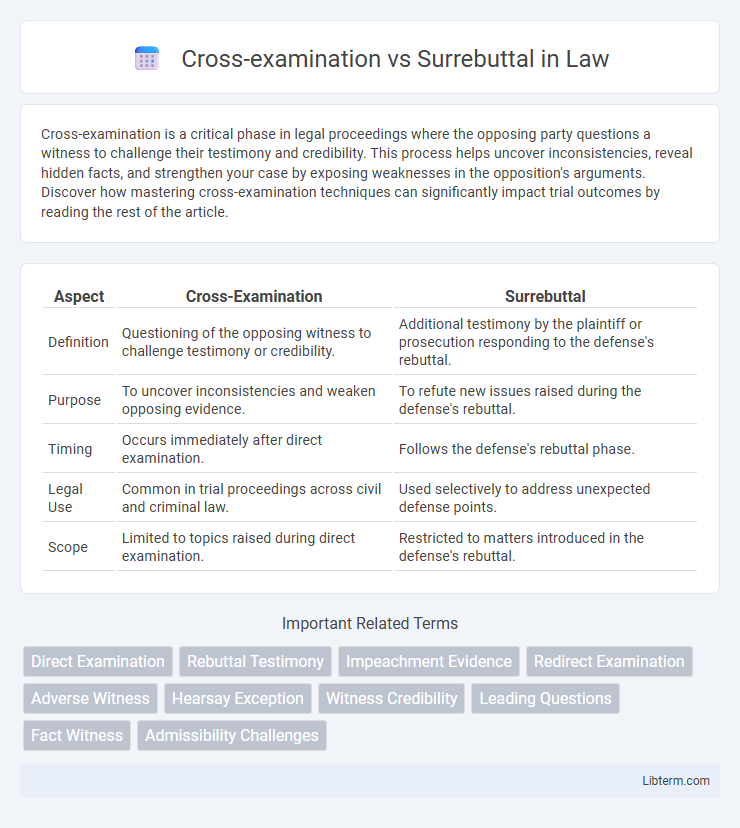Cross-examination is a critical phase in legal proceedings where the opposing party questions a witness to challenge their testimony and credibility. This process helps uncover inconsistencies, reveal hidden facts, and strengthen your case by exposing weaknesses in the opposition's arguments. Discover how mastering cross-examination techniques can significantly impact trial outcomes by reading the rest of the article.
Table of Comparison
| Aspect | Cross-Examination | Surrebuttal |
|---|---|---|
| Definition | Questioning of the opposing witness to challenge testimony or credibility. | Additional testimony by the plaintiff or prosecution responding to the defense's rebuttal. |
| Purpose | To uncover inconsistencies and weaken opposing evidence. | To refute new issues raised during the defense's rebuttal. |
| Timing | Occurs immediately after direct examination. | Follows the defense's rebuttal phase. |
| Legal Use | Common in trial proceedings across civil and criminal law. | Used selectively to address unexpected defense points. |
| Scope | Limited to topics raised during direct examination. | Restricted to matters introduced in the defense's rebuttal. |
Introduction to Cross-examination and Surrebuttal
Cross-examination is the phase in a trial where an attorney questions the opposing party's witnesses to challenge their credibility and uncover inconsistencies, strengthening their own case. Surrebuttal follows rebuttal and allows the original party to respond to new evidence or arguments introduced, ensuring a fair chance to address surprises. Both play crucial roles in the adversarial legal process, balancing the presentation and contestation of evidence.
Definition of Cross-examination
Cross-examination is a critical phase in legal proceedings where the opposing counsel questions a witness to challenge the credibility and reliability of their testimony. It aims to expose inconsistencies, biases, or inaccuracies by probing the witness's statements made during direct examination. Unlike surrebuttal, which provides new evidence to counter a rebuttal, cross-examination focuses on testing the testimony already presented in court.
Definition of Surrebuttal
Surrebuttal refers to the stage in a legal trial where the party who presented the original rebuttal evidence introduces additional evidence or testimony to counter new points raised by the opposing party during rebuttal. Unlike cross-examination, which involves questioning a witness to challenge their testimony or credibility, surrebuttal allows the introduction of new evidence specifically to respond to rebuttal arguments. This phase ensures that each side has an opportunity to address any unexpected claims introduced after the initial presentation of evidence.
Purpose of Cross-examination in Legal Proceedings
The purpose of cross-examination in legal proceedings is to challenge the credibility and reliability of the opposing party's witnesses by probing inconsistencies and uncovering biases. It allows attorneys to test the accuracy of testimony through targeted questioning, aiming to weaken the opponent's case and reinforce their own argument. Effective cross-examination is a critical tool for exposing falsehoods and clarifying facts before the court.
Role of Surrebuttal in the Trial Process
Surrebuttal serves as a critical phase in the trial process, allowing the plaintiff to respond specifically to new evidence or arguments introduced during the defendant's rebuttal, ensuring balanced examination of issues. It enhances the adversarial nature of trials by preventing unfair surprise and enabling the plaintiff to clarify or counter unexpected points. This role supports the court's objective of a comprehensive and fair fact-finding mission by keeping the evidentiary record complete and responsive.
Key Differences Between Cross-examination and Surrebuttal
Cross-examination involves questioning the opposing party's witness to challenge credibility and the accuracy of their testimony. Surrebuttal is a limited opportunity to introduce evidence or arguments specifically addressing new issues raised during rebuttal closing arguments. The key difference lies in cross-examination's role in testing witness statements, while surrebuttal serves as a targeted response to late-stage claims in trial proceedings.
Legal Standards Governing Each Procedure
Cross-examination involves questioning a witness called by the opposing party to challenge their testimony under strict Federal Rules of Evidence, including limitations on relevance and scope to ensure fairness. Surrebuttal allows the party who presented initial rebuttal evidence to introduce new evidence or witnesses aimed at addressing new issues raised during rebuttal, governed by court discretion and procedural rules ensuring the response remains focused and directly related. Legal standards require that cross-examination adhere to evidence admissibility and credibility assessment, while surrebuttal must be confined to matters newly presented, maintaining procedural fairness and avoiding unnecessary repetition.
Strategies for Effective Cross-examination
Effective cross-examination strategies emphasize focused, concise questioning that exposes inconsistencies and challenges a witness's credibility through precise control of the narrative. Employing leading questions that limit the witness's ability to deviate, while anticipating and countering possible defenses, strengthens the impact of testimony. Utilizing documented evidence strategically during cross-examination heightens pressure on the witness and reinforces the advocate's case.
Techniques for Successful Surrebuttal
Successful surrebuttal hinges on understanding the key differences from cross-examination, emphasizing targeted responses to new evidence introduced during rebuttal. Techniques include carefully identifying and isolating new facts or arguments, using concise and focused questioning to undermine the opposition's rebuttal, and maintaining control over the narrative by avoiding unnecessary repetition of previously covered material. Effective surrebuttal sharpens contradictions and reinforces the original case, leveraging strategic preparation and real-time adaptability to maximize impact.
Impact of Cross-examination and Surrebuttal on Case Outcomes
Cross-examination allows attorneys to challenge the credibility and reliability of opposing witnesses, often shaping the jury's perception and significantly influencing case outcomes by exposing inconsistencies or weaknesses in testimony. Surrebuttal provides the opportunity to respond directly to rebuttal evidence, reinforcing a party's position and addressing potential damages to their argument. The strategic use of both techniques can decisively affect the strength of the case, swaying judgments and verdicts in complex litigation.
Cross-examination Infographic

 libterm.com
libterm.com